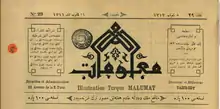 Cover page | |
| Categories | Political magazine |
|---|---|
| Frequency | Weekly |
| Publisher | Ibn Hakkı Mehmet Tahir |
| Founded | 1894 |
| First issue | February 1894 |
| Final issue | 1903 |
| Country | Ottoman Empire |
| Based in | Istanbul |
| Language |
|
| OCLC | 24325961 |
Malumat (Ottoman Turkish: The Information), also known as Musavver Malumat (Ottoman Turkish: The Pictorial Information), was an Ottoman weekly literary and political magazine which was published in Istanbul in the period 1894–1903.[1] It was circulated during the reign of Sultan Abdulhamit and was one of his supporters.[1] Renée Worringer, a Canadian scholar on the Islamic and Middle East history, describes Malumat as the mouthpiece for Yıldız Palace which refers to the Hamidian era.[2]
History and profile
Malumat was started in 1894, and the first issue appeared in February 1894.[1] Its license holder and publisher was Mehmet Tahir who was an ardent supporter of Sultan Abdulhamit with whom he had close connections.[1] Another figure related to the magazine was Artin Asedoryan who was cited as the owner from 1895 to the 48th issue.[3] Malumat appeared on Thursdays and billed itself as a literary, scientific and political journal.[1] However, its political content became much more salient than its literary material.[1] It contained both Ottoman Turkish and French articles.[4] Notable contributors included Tevfik Fikret, Cenap Şahabettin, Ahmet Rasim,[5] Yusuf Akçura, Hüseyin Cahit Yalçın, Ahmet Muhtar Paşa, Ahmet Mithat and Nazif Sururi.[1]
In Beirut an Arabic edition of Malumat was published entitled Al Malumat.[3] One of the rivals of Malumat was Servet-i Fünun, a progressive avant-garde Ottoman literary magazine.[1][6]
Malumat, Al Malumat and Servet, a newspaper also published by Mehmet Tahir, covered news accusing the Dutch colonial rule of being hostile to the Muslims living in the Dutch East Indies, including Java.[3] Upon these news the Dutch ambassador Wilhelm Ferdinand Heinrich von Weckherlin sent a note to the Sultan demanding the cancellation of these publications.[3] The request of the Dutch was followed for a while, but the news continued from 1901.[3] Malumat folded in 1903.[1]
References
- 1 2 3 4 5 6 7 8 9 Salih Okumuş; Alev Bal (2011). "Review of the Malumat (Newspaper) in the Respect of Shape, Content and the Authors (the Copies 1-100)". ODU Journal of Social Sciences Research. 2 (3): 167–168. Archived from the original on 20 February 2022.
- ↑ Renée Worringer (May 2004). ""Sick Man of Europe" or "Japan of the near East"?: Constructing Ottoman Modernity in the Hamidian and Young Turk Eras". International Journal of Middle East Studies. 36 (2): 207–230. doi:10.1017/S0020743804362033. S2CID 156657393.
- 1 2 3 4 5 Erol Baykal (2011). "The Ottoman Press and the Dutch East Indies at the beginning of the twentieth century". Turkish Historical Review. 2 (1): 1–17. doi:10.1163/187754611X570918.
- ↑ Erin Hyde Nolan (Spring 2019). "The Gift of the Abdülhamid II Albums: The Consequences of Photographic Circulation". Circulation. 9 (2). hdl:2027/spo.7977573.0009.207.
- ↑ Cevat Fehmi Baskut (February 1964). "Prominent Figures in Turkish Journalism". International Communication Gazette. 10 (1): 88. doi:10.1177/001654926401000113. S2CID 144350383.
- ↑ Hatun Altay (2019). Servet Malumat Gazetesi (201-300. Sayılar) Tahlilî Dizin - İnceleme Ve Seçilmiş Metinler (MA thesis) (in Turkish). Cumhuriyet University.
External links
 Media related to Malumat at Wikimedia Commons
Media related to Malumat at Wikimedia Commons- Malumat archive SALT Research